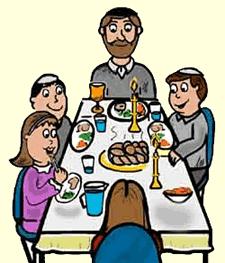 In the Torah, we learn about man’s encounters with angels. In Avraham Avinu’s household, angels were a common occurence, even Hagar was aware of them, as she merited living in Avraham’s household. Yaakov Avinu also encountered angels in his journeys to and from the land of Israel. In our siddur, especially on Friday night, we recite “Shalom Alecheim” where we have a tradition that two angels accompany the men home from shul and the angels inspect the condition of our homes on Shabbos.
In the Torah, we learn about man’s encounters with angels. In Avraham Avinu’s household, angels were a common occurence, even Hagar was aware of them, as she merited living in Avraham’s household. Yaakov Avinu also encountered angels in his journeys to and from the land of Israel. In our siddur, especially on Friday night, we recite “Shalom Alecheim” where we have a tradition that two angels accompany the men home from shul and the angels inspect the condition of our homes on Shabbos.
The negative angel recedes to the blessing of the positive angel that says “May it be like this next Shabbos”, and vice versa. But if we study the text of Shalom Alecheim carefully, we will find a problem in one of the stanzas…
I heard a lecture given by Rav Eliezer Gibber of New England Rabbinical College recently, which addresses angels and blessings, and a problematic wording of a stanza in our Shabbos evening custom of reciting Shalom Alecheim.
The first paragraph of Shalom Alecheim begins with “Shalom Alecheim Malachei Hashoreys, Malachay Elyon….” which greets the angel with peace.
The second paragraph of Shalom Alecheim continues with “Boachem leshalom, malachei hashalom, …” which we invite the angels to come in peace.
The third paragraph of “Borchuni leshalom, malachay hashalom…” is a request to ask the angels to bless me for peace. This request is a problem, according to the Rambam.
The Rambam writes in his introduction to Chapter 10 of Sanhedrin (“Peirek Cheilek), “The Holy One … is worthy of being served and of being exalted … and this service should not be to anything which is beneath Him in nature, or among the angels … In addition, it is not proper to worship them as intermediaries, in an effort to approach Him.” — Rabbi Binyamin Tabori
For one who recites “Borchuni leshalom” with the intention of requesting a blessing from the angel transgresses the law of idolatry as we are asking for peace through an intermediary and not directly to Hashem.
The same idea appears in the Talmud Yerushalmi: “If someone is beset by trouble, he should not pray to Michael or Gavriel, he should pray to me, and I will immediately respond” [Berachot 9:1]. But the Ramban has extended this concept: not only is man privileged in that he can turn directly to G-d, not only is there no need to turn to an intermediary, not only is it improper for a true believer to do so, in addition – and this is the innovation of the Ramban – even if one turns to the angels, they do not have the power to help. — Rabbi Binyamin Tabori
So I have understood the reasoning behind why some families do not even recite Shalom Alecheim at their Shabbos table. There are also others who recite Shalom Alecheim but not the third stanza, and there are others who change the wording from “Borchuni” to “Yevorchuni” which means “They will bless me”. The latter being a statement and not a request.
The fourth paragraph of “Tzeschem l’shalom…” is telling the angels to depart in peace, is not a problem where the Rambam is concerned.
So, we have to be extra careful with the prayers that we recite regularly especially if they have anything to do with angels!
